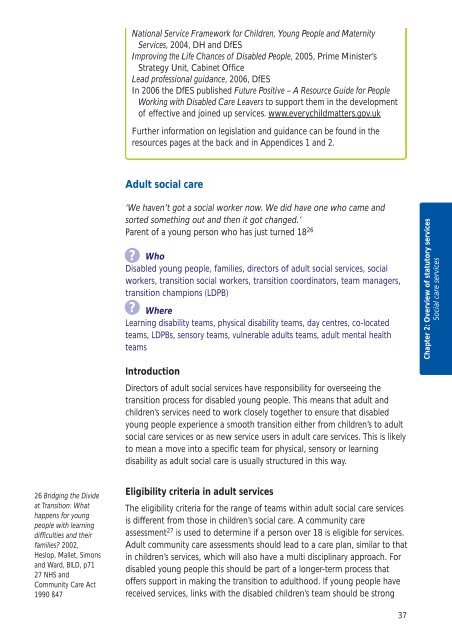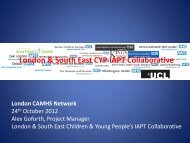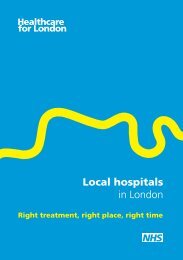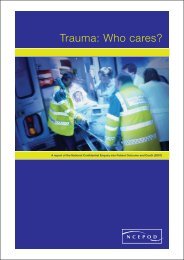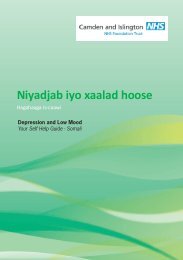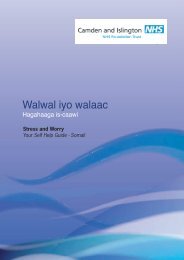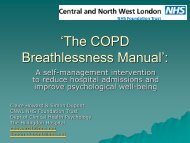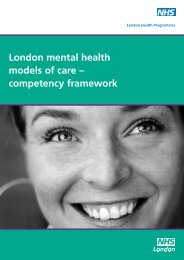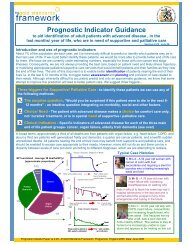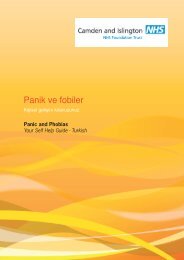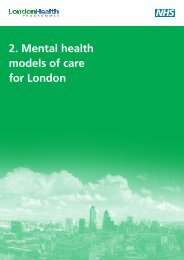A Transition Guide for All Services - Transition Information Network
A Transition Guide for All Services - Transition Information Network
A Transition Guide for All Services - Transition Information Network
- No tags were found...
You also want an ePaper? Increase the reach of your titles
YUMPU automatically turns print PDFs into web optimized ePapers that Google loves.
National Service Framework <strong>for</strong> Children, Young People and Maternity<strong>Services</strong>, 2004, DH and DfESImproving the Life Chances of Disabled People, 2005, Prime Minister’sStrategy Unit, Cabinet OfficeLead professional guidance, 2006, DfESIn 2006 the DfES published Future Positive – A Resource <strong>Guide</strong> <strong>for</strong> PeopleWorking with Disabled Care Leavers to support them in the developmentof effective and joined up services. www.everychildmatters.gov.ukFurther in<strong>for</strong>mation on legislation and guidance can be found in theresources pages at the back and in Appendices 1 and 2.Adult social care‘We haven’t got a social worker now. We did have one who came andsorted something out and then it got changed.’Parent of a young person who has just turned 18 26?WhoDisabled young people, families, directors of adult social services, socialworkers, transition social workers, transition coordinators, team managers,transition champions (LDPB)?WhereLearning disability teams, physical disability teams, day centres, co-locatedteams, LDPBs, sensory teams, vulnerable adults teams, adult mental healthteamsChapter 2: Overview of statutory servicesSocial care servicesIntroductionDirectors of adult social services have responsibility <strong>for</strong> overseeing thetransition process <strong>for</strong> disabled young people. This means that adult andchildren’s services need to work closely together to ensure that disabledyoung people experience a smooth transition either from children’s to adultsocial care services or as new service users in adult care services. This is likelyto mean a move into a specific team <strong>for</strong> physical, sensory or learningdisability as adult social care is usually structured in this way.26 Bridging the Divideat <strong>Transition</strong>: Whathappens <strong>for</strong> youngpeople with learningdifficulties and theirfamilies? 2002,Heslop, Mallet, Simonsand Ward, BILD, p7127 NHS andCommunity Care Act1990 ß47Eligibility criteria in adult servicesThe eligibility criteria <strong>for</strong> the range of teams within adult social care servicesis different from those in children’s social care. A community careassessment 27 is used to determine if a person over 18 is eligible <strong>for</strong> services.Adult community care assessments should lead to a care plan, similar to thatin children’s services, which will also have a multi disciplinary approach. Fordisabled young people this should be part of a longer-term process thatoffers support in making the transition to adulthood. If young people havereceived services, links with the disabled children’s team should be strong37


